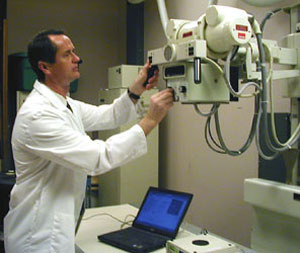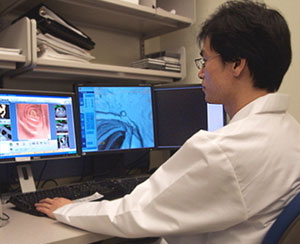Medical Physicist
Tasks & duties

Medical physicists may do some or all of the following:
-
set up high-tech medical equipment and computer software for diagnostic and therapeutic use
-
test and set up equipment and computer software to ensure that patients having diagnostic procedures are getting the correct doses of radiation
-
work with medical professionals to ensure safe and correct delivery of radiation treatment for patients
-
liaise with medical professionals on treatments required for patients
-
ensure safe practice in the use, handling and storage of radioactive materials
-
check sites of possible radiation leakage using radiation measuring equipment, and ensure radiation levels comply with health and safety legislation
-
design new developments in equipment and techniques
-
commission high-tech medical equipment for diagnostic and therapeutic use
-
train staff and students in how to use new equipment and carry out new procedures
-
contribute to the design of new medical facilities
Specialisations
The two main speciality areas in medical physics are:
-
radiation treatment for cancer (radiation oncology)
-
diagnosing disease using medical imaging such as x-rays and computed tomography (CT) scanners
Ninety percent of medical physicists in New Zealand work in radiation oncology.
Skills & knowledge

Medical physicists need to have:
-
up-to-date knowledge of physics and how to apply their knowledge of physics into medicine
-
good knowledge of anatomy, physiology and radiation biology
-
up-to-date knowledge of medical technology and equipment
-
knowledge of the use of radiation to treat cancer or diagnose disease
-
skill using electronics-testing equipment and computer software
-
maths skills
-
written and oral communication skills
Entry requirements
To become a medical physicist you need to have a Bachelor of Science (BSc) in physics or a Bachelor of Engineering (BE) with a large focus on maths and physics. After this you will be required to complete five years of on-the-job training as a medical physics registrar to gain a Masters of Science in medical physics.
The course is run through Canterbury University and can be done through a number of hospitals in New Zealand. The hospital will normally sponsor you by paying the course fees and providing you with an annual salary.
When your time as a registrar is complete, you can apply for registration through the Australasian College of Physical Scientists and Engineers in Medicine (ACPSEM).
Secondary education
A tertiary entrance qualification is needed to enter training. Useful subjects include physics, biology, chemistry and mathematics.
Training on the job
Medical physicists gain many skills on the job. They are required to regularly attend seminars and conferences to keep up to date with new developments in technology and treatments.
Registration
Medical physicists normally register with the Australasian College of Physical Scientists and Engineers in Medicine (ACPSEM) before they call themselves medical physicists.
Useful experience
Useful experience for people wanting to train as medical physicists includes:
-
experience in another branch of physics
-
any work involving medical equipment or electronics
Related courses
Medical Science
Physics
For more information, please refer to Career Services.
Document Actions
